- FoititikaNea Newsroom
- |
Επιστολή φοιτητών του Πανεπιστημίου Κρήτης για την επιστροφή των γλυπτών του Παρθενώνα
Επιστολή προς το Βρετανικό Μουσείο μέσω της οποίας ζητούν με επιχειρήματα, την επιστροφή των γλυπτών του Παρθενώνα, απέστειλαν οι φοιτητές στο Παιδαγωγικό Τμήμα Δημοτικής Εκπαίδευσης του Πανεπιστημίου Κρήτης.
Πρόκειται για μία πρωτοβουλία των φοιτητών την οποία στηρίζει ο Διδάσκων Καθηγητής στο Τμήμα, Εμμανουήλ Χαλκιαδάκης.
Όπως αναφέρει ο κ. Χαλκιαδάκης μεταξύ άλλων "Τη συνημμένη επιστολή που συνέταξα με τους φοιτητές μου την υπέγραψαν όσοι παρακολούθησαν το μάθημα και ενδιαφέρονταν για την υπόθεση της επιστροφής των γλυπτών. Δυστυχώς, δεν μας απάντησαν από το Βρετανικό Μουσείο, αν και αναμενόμενο, εντούτοις, μας απάντησε θερμά η Διεθνής Ένωσης για την Επανένωση των Γλυπτών του Παρθενώνα και είχαμε θετικές απαντήσεις τόσο από την ίδια τη Διεθνή Ένωση όσο και από τμήματα της Ένωσης σε διάφορες χώρες, από τη Βρετανία μέχρι την Αυστραλία.
Επειδή συνηθίζω να λέω στους φοιτητές μου ότι καλό να είναι ενεργοί πολίτες και να προσπαθούν για το δίκαιο, ακόμα και αν οι πιθανότητες να το πετύχουν δεν είναι υπέρ τους, θεώρησα καλό αυτήν την πρωτοβουλία να τη δημοσιοποιήσω. Να σημειωθεί ότι τη συνημμένη επιστολή υπογράφουν εκτός από εμένα και 153 φοιτητές και φοιτήτριές μου που παρακολούθησαν το συγκεκριμένο μάθημα και θα είναι οι αυριανοί δάσκαλοι των σχολείων μας (κάποιοι ήδη αποφοίτησαν από το Πανεπιστήμιο το καλοκαίρι)".
Η επιστολή
To the Directorate of the British Museum
Dear Sir/Madam,
We are writing this letter in order to ask you to reconsider permitting the return of the Parthenon marbles to the place where historically and physically they belong.
In the early 19th century Thomas Bruce, 7th Earl of Elgin, removed sculptures from the Parthenon, and exported them to Britain. Elgin took advantage of the fact that he was the British ambassador to the Sublime Porte and that Greece was under Ottoman rule. Lord Elgin claimed to have received from the ottoman authorities a firman (official permission) that allowed him to remove the marbles from the Parthenon and exported them to his country.
However, more recent historical research has proven that no Sultan's firman has ever allowed the removal and transfer of the Parthenon marbles abroad. Quite simply, no such firman has been found in the Ottoman archives. Elgin claimed that the removal and transfer of the Parthenon marbles was done with sultan’s permission. Nevertheless, the specific document Elgin relied on was a personal letter from the Kaymakam Pasha giving him permission to take plaster casts of the sculptures but in no way to cause any damage to the monument. On the other hand, this letter could have never been a substitute for a Sultan's firman.
Noteworthy, in the early 19th century, a few years before the Greek Revolution broke out, Greeks were under Ottoman rule. This is a parameter that must be taken into account very seriously. It is like hypothetically saying that there is a war, Britain is occupied and the conquerors sell William Terner’s finest paintings to a rich man of another country. Are they legitimised to do that? Of course not…
As stated by the memorable actress and minister of culture of Greece Melina Mercouri in the World Conference on Cultural Policies, organised by UNESCO in Mexico, an elderly Greek man approached the later Lord Bronkton, on a visit to Athens in 1809, and in a voice trembling with bitterness said: “You English have taken from us the works of our ancestors. Look after them well, because the day will come when the Greeks will ask for them back”. It is also known that the Greek Rebel and General Ioannis Makriyiannis prevented the sale of two ancient statues to foreigners, with the words “it was for them we fought”.
More than two centuries have passed since the Parthenon marbles were removed from their home. It has been more than 200 years since the Greeks rose up to win their freedom. It is high time that an injustice to the Greeks and the Hellenic civilisation is redressed, because the marbles of the Parthenon carry the highest
symbolism for Greece and the Greeks and are an integral part of the Greek cultural heritage. The marbles of Parthenon symbolise the most brilliant, the most creative moments of Hellenism. It is worth mentioning that the Parthenon sculptures in the British Museum are divided single works of Art which must be reunited with the sculptures in Greece. This year, Pope Francis returned to Greece the Parthenon marbles held by the Vatican Museums for some 100 years. It is time for the British museum to follow this example.
We thank the British Museum for housing these artworks from Pentelic marble over these centuries. But now, the time has come for them to return home. We recognise that the British Museum is one of the most famous museums in the world. But now, in Greece, there is one place that was built to house the most glorious creations of Greek civilization, including the Parthenon marbles, and that is none other than the Acropolis Museum.
Since the British Museum has antiquities from almost all parts of the world, it would be useful to continue to exhibit artifacts from ancient Greek civilisation. Although we are not the ones to decide, we would like to suggest that in place of the Parthenon marbles, temporary exhibitions of antiquities from Greece should be displayed and changed frequently. The latter would be an added motive for the administration of the British Museum to consent to the transfer of the marbles to their natural habitat in Athens. The return of the Parthenon Marbles will open a new path in British-Greek relations and will seal the good relations between the two countries.
Let us remind you that it is said that during the first siege of Acropolis (in 1821) by the Greeks, Turks who were fortified in it removed the lead that exists in the joints of the stones of the monuments. The Greek rebels seem to have sent bullets to the Turks to fight them in order to stop the destruction of the monument.
If you cannot listen to our voice, listen to the voice of the British people. Listen to the voice of Lord Byron who attacked to Lord Elgin for his vandalism in Akropolis with his poems “The Curse of Minerva” and “Childe Harold’s Pilgrimage”. Listen to the writer Edward Daniel Clarke who said that the temple had sustained great injury and that he saw no need for the authentic sculptures to have been removed when casts of the artworks had already been made. Listen to various British Olympic medal winners who have expressed their support for the return of the Parthenon Sculptures to Greece. Listen to all the British people of letters and arts who support this request. Listen to British public opinion, the majority of which is in favour of returning the Parthenon marbles to Athens (https://news.gtp.gr/2021/11/25/poll-more-britons-in-favor-of-returning-parthenon-marbles-to-greece/). Remember the help our country offered to U.K. at various phases of our common history and especially during the World War II.
The Parthenon marbles should be returned to their home, should be returned to Greece. We hope for a positive response to our fair request.
Rethimno (University of Crete), 30 June 2023
Dr Emmanouil Chalkiadakis (University of Crete)
Lab Teaching Staff, University of Crete Tutor, Hellenic Open University
Scientific Collaborator, Lincoln University (New Zealand) Visiting Scholar, University of London
F. Associate, C.H.S., Harvard University
F. Visiting Professor, I.O.C.S., Cambridge
F. Senior Associate, St Antony’s College, University of Oxford
The future Greek Schools teachers and presently students of the University of Crete who have attending the course “Ancient Greek History: The Greek Antiquity and its reception in modern times” (School of Education, Department of Primary Education)
- Nikos Karadakis
- Marilena Dimitraki
- Maragkoudaki Christina
- John Milonakos
- Irini Vasilaki
- Savvorginaki Maria
- Ioanna Patlia
- Chrysoula Michou
- Maria Syskaki
- Evangelia Nasiou
- Georgia Ladoukaki
- Athina Malliou
- Aliki Desdenaki
- Marina Tzorakoleftheraki
- Evlavia Nikitaki
- Katerina Kavvalou
- Konstantinos Nikolopoulos
- Stylianos Drivas
- Irene Papadogiorgaki
- Anna Sfakianaki
- Sinem Chatzichalil
- Maria Xezonaki
- Markella Drapeti
- AntoniosKoutsouklakis
- Antonia Foukaraki
- Evangelia Fountouradaki
- Efstratia Karafasouli
- Maria Vavouraki
- Georgia Anogeianaki
- Rodolpha Ikonomki
- Daniela Shabani
- Panagiotis Pappas
- Foteini Tomara
- Evangelos Kyriakoulias
- Alexia Pontikaki
- Panagiota Daoudaki
- Maria Dimitrokalli
- Elisavet Plaiti
- Vasiliki Kokkinaki
- Amelie – Dimitra Goring – Chashiotis
- Kostas Desdenakis
- Aikaterini Kokkinaki
- Konstantinos Fanourakis
- Christos Georgiou
- Efthymios Daoulas
- Andreas Valoglou
- Dima Xanthippi
- Emmanouil Androulakis
- Antonios Drakakis
- Maria – Eleni Tragka
- Vasileia Zampetaki
- Anastasia Satiri
- Konstantina Kroustalaki
- Maria Lioliou
- Emmanouil Chalikakis
- Georgia Thymaki
- Eumenios Loukogeorgakis
- Athina Karnava
- Kyranna Peteineri
- Polyxeni Kargiofylli
- Georgios Bodouroglou
- Ioannis Xypolias
- Evaggelia Notaki
- Konstantina Thomaki
- Zafiris Varvarigos
- Andrew Miliarakis
- Spyridon Karadakis
- Claudia Ferro
- Taxiarchoula – Amalia Megaloudi
- Georgia Inglezaki
- Spyros – Raphael Kambouris
- Maria Sifaki
- Elena Vasilaki
- Helen Evanthia Paraskevopoulou
- Angeliki Fragkiadaki
- Electra Papadimitriou
- Konstantina Antonaki
- Maria Fragkouli
- Irini Kokologianni
- Georgia Vrentzou
- Georgia Pervolaraki
- Diamantis Tasi
- Antonia Tsalta
- Maria Katsouli
- Eleni Papaleonida
- Eleni – Konstantina Titopoulou
- Evagelia Tsilivigkou
- Maria Dermitzaki
- Nikoleta Daniul
- Georgia Sidira
- Chrysi Panagioulaki
- Stavroula Karantzouli
- Theofania Askoxylaki
- Ioanna Patsouraki
- Dimitra Moschona
- Pagona Fanouraki
- Ioannis Chatzidakis
- Emmanouil Stamatakis
- Nikoleta Flaskou
- Fragkoula Koronaiou
- Fotini Stavroulaki
- Eudokia Papastefanaki
- Eleni Paraskevi Bousiou
- Georgios Kiparakis
- Evmorfia Maria Deligianni
- Ornela Merkuri
- Grigorios – Anastasios Savianidis
- Aikaterini Inglezaki
- Panagiotis Trichias
- Marianthi Zoumi
- Giorgos Archondakis
- MelanthiaTsachaki
- Kalliopi Anastasaki
- Aikaterini Patrelaki
- Eleftherios Metaxakis
- Anna – Maria Galiropoulou
- Ioannis Michelakis
- Vasiliki Chalka
- Antrea Louka
- Maria - Ioanna Vlachaki
- Kyriaki Kokkali
- Maria Konnini
- Kalliopi Katsprakaki
- Pigi Raikou
- John Petousis
- Nefeli Tassopoulou
- Irene Kokosiouli
- Marianna Koutsoukanidi
- Eleftheria Kornizaki
- Dafni Routa
- Tzouanaki Michaela
- Irene Koutentaki
- Eva Parasyri
- Margianna Moutsana
- Nikoleta Panagiotaki
- Chrysovalantou Moula
- Singh Kirandeep Kaur
- Aikaterini Maragkoudaki
- Kassiani Kotsarini
- Eva Voskaki
- Georgia Mousouraki
- Dimitra Kazakou
- Sofia Lentaraki
- Emmanouela Georgia Hatziadam
- Maria - Ioanna Sapounaki
- Georgios Katsamanis
- Emmanouil Theodorakis
- Marina Eleni Tsakoumi
- Maria Lampaki
- Kalliopi Trichaki
- Anna Zacharaki
- Rodanthy Kastellianaki
- Eleftheria Galanaki
⁕Τhe original document with the signatures is kept in the faculty member's office.
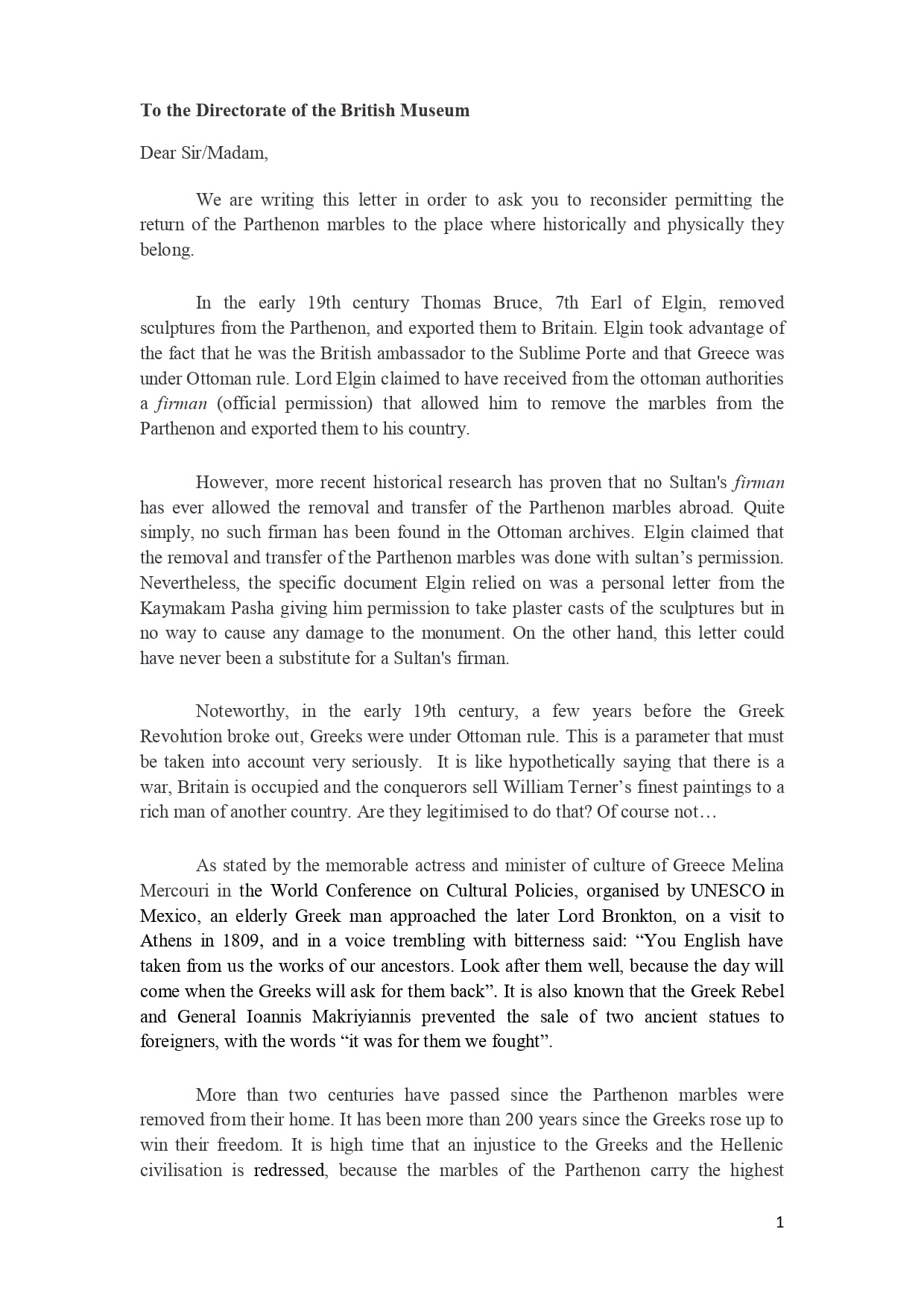
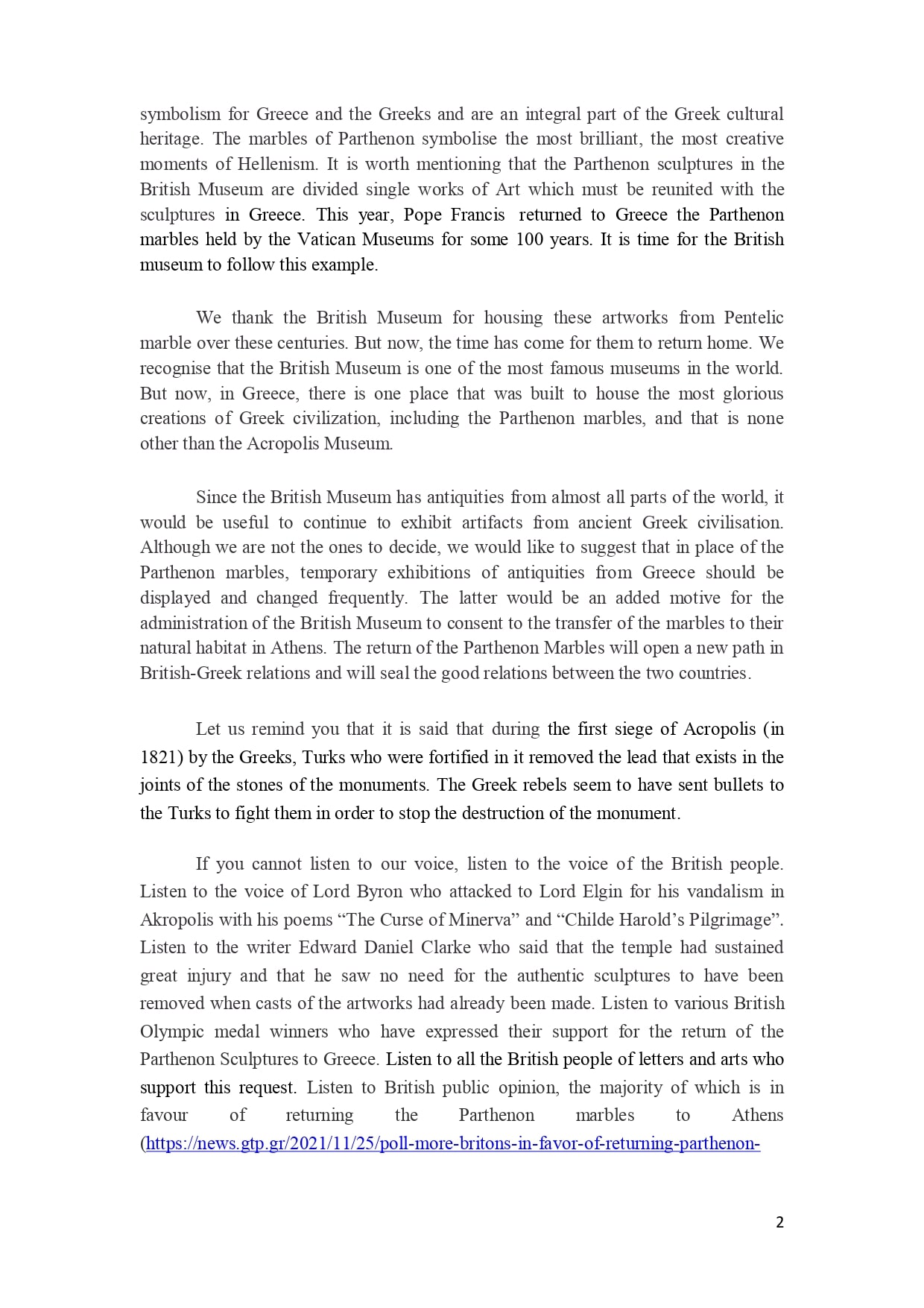
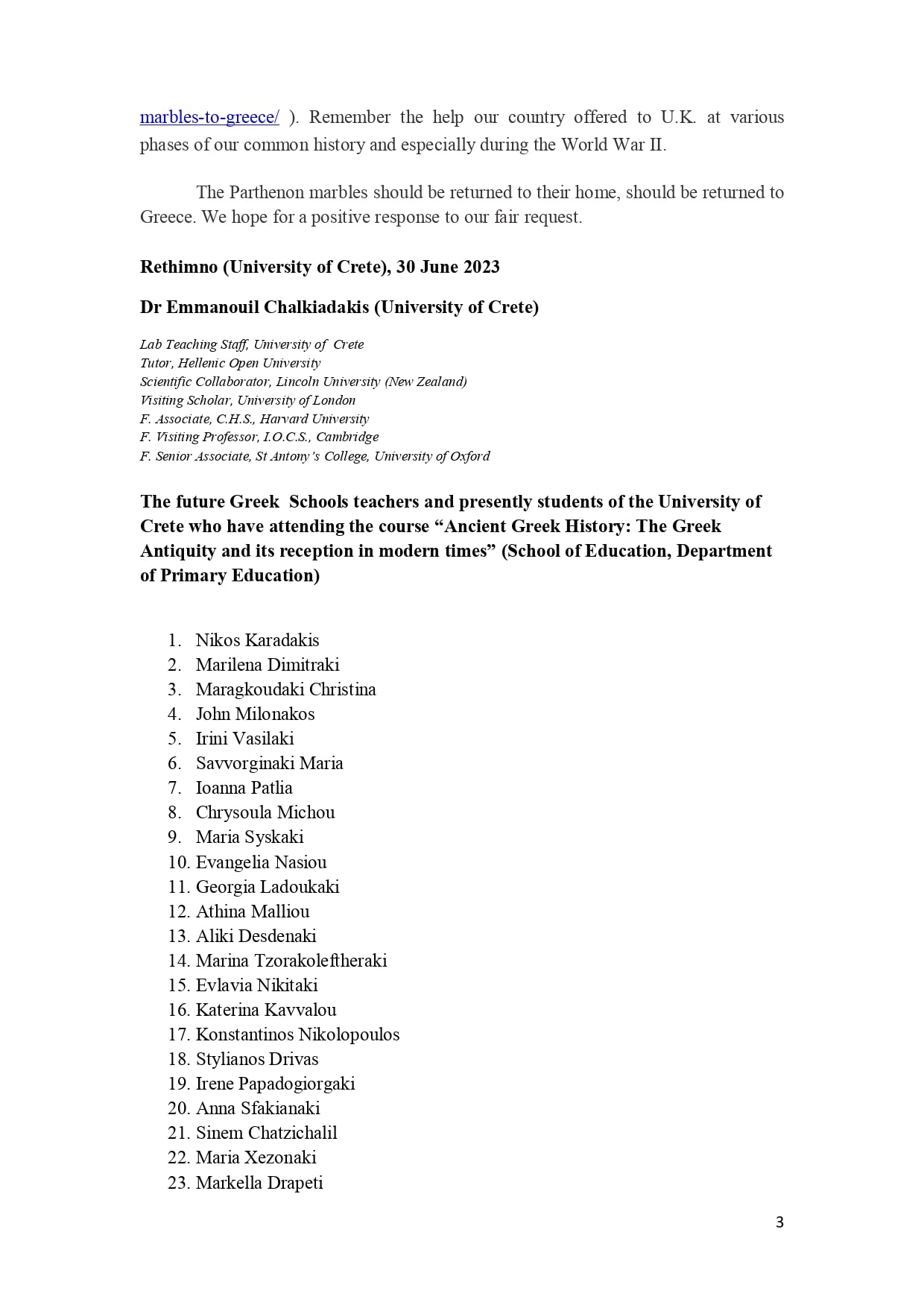
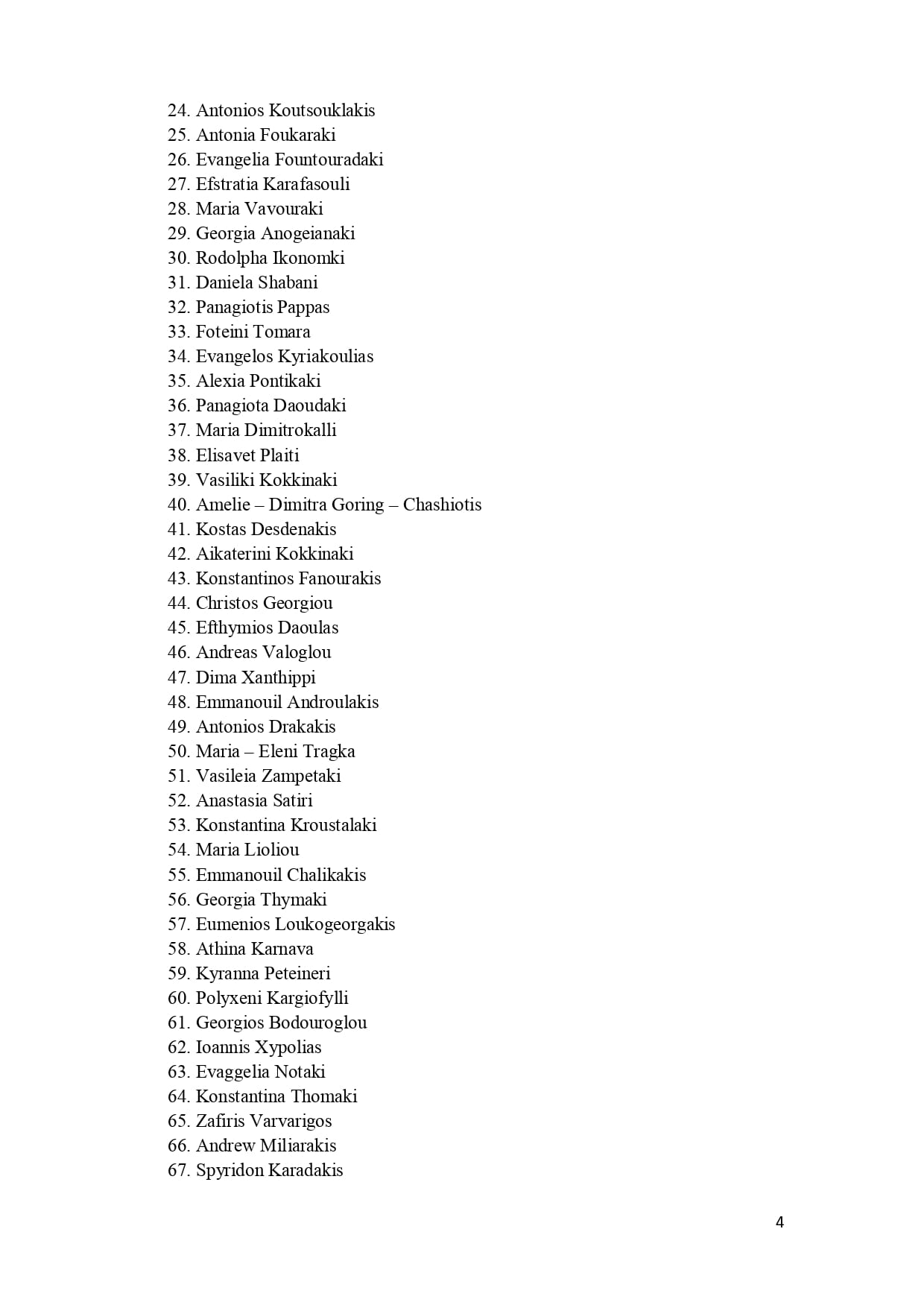
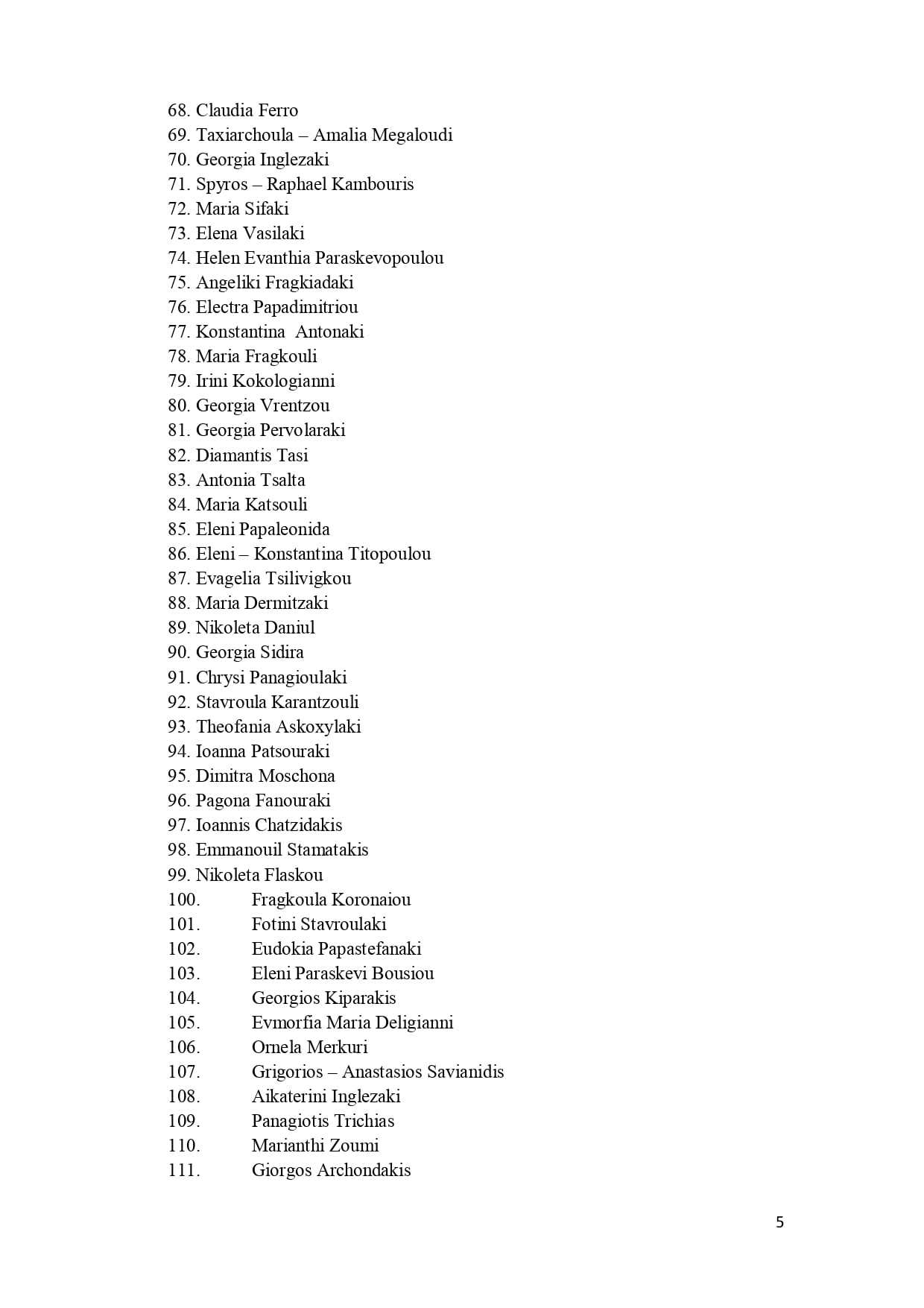
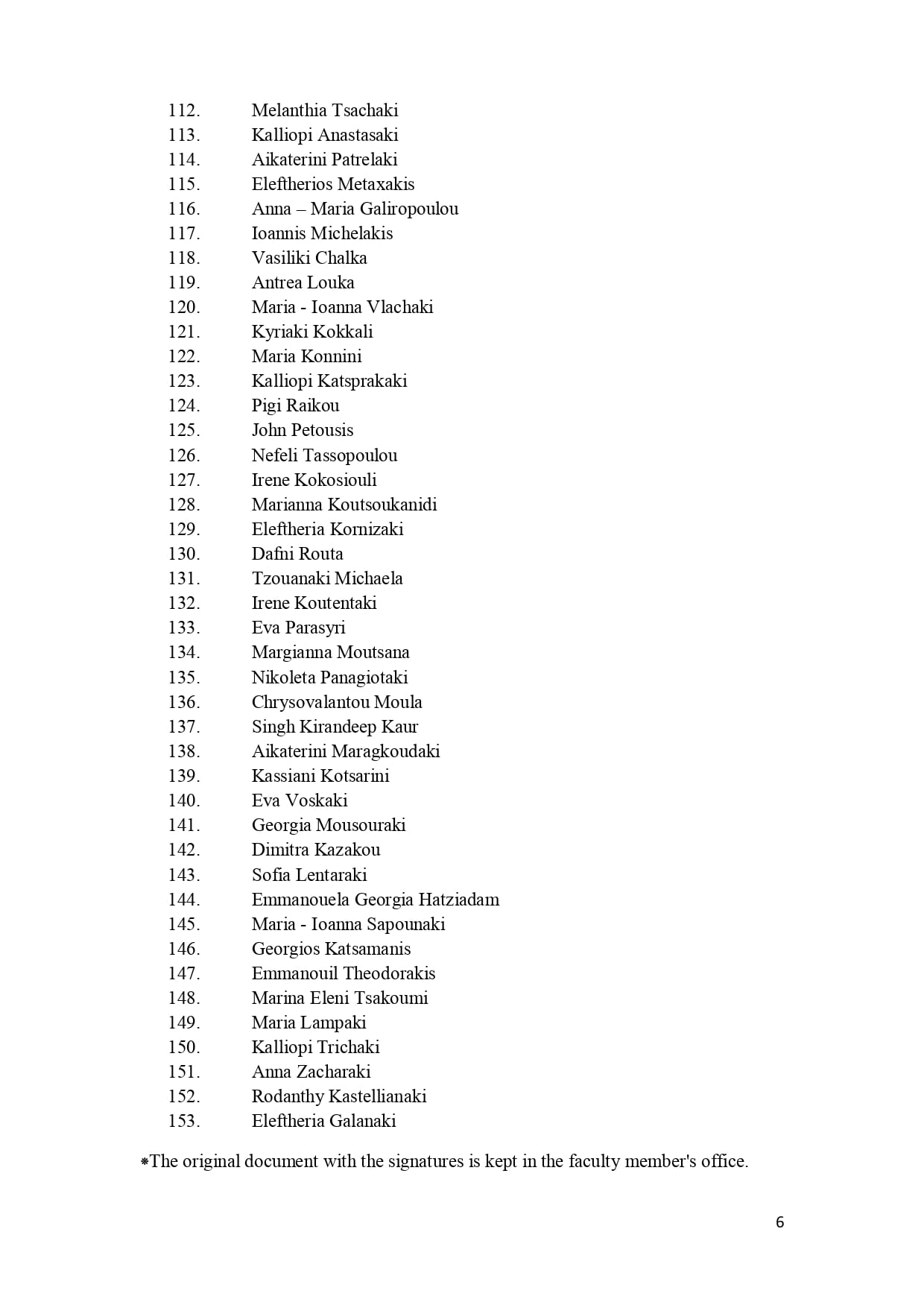



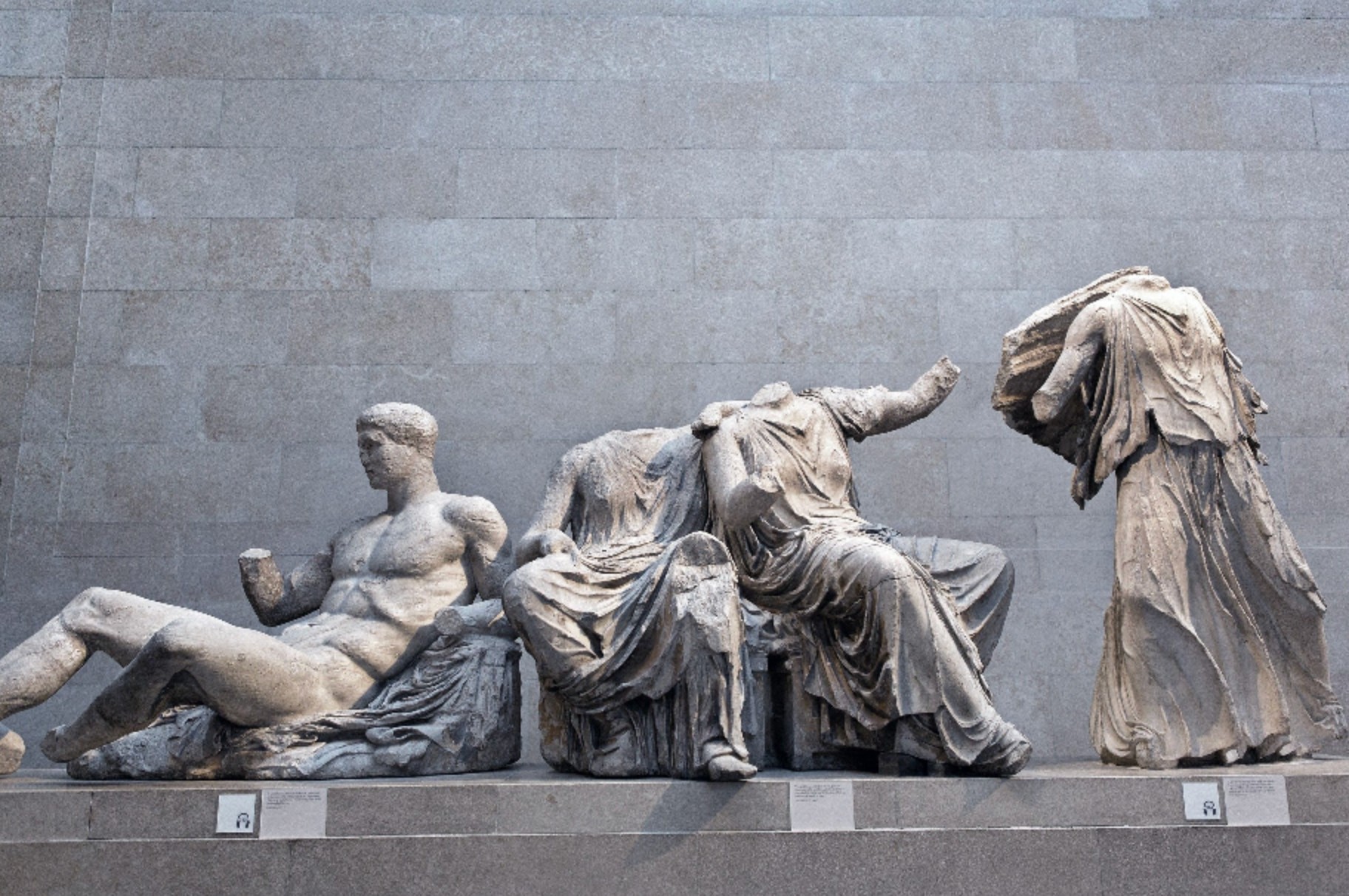
 ΔΕΙΤΕ ΠΡΩΤΟΙ ΟΛΑ ΤΑ ΝΕΑ ΤΟΥ ΦΟΙΤΗΤΙΚΑ ΝΕΑ ΣΤΟ GOOGLE NEWS
ΔΕΙΤΕ ΠΡΩΤΟΙ ΟΛΑ ΤΑ ΝΕΑ ΤΟΥ ΦΟΙΤΗΤΙΚΑ ΝΕΑ ΣΤΟ GOOGLE NEWS

